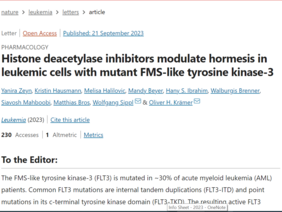New Publication from the Krämer Lab on how histone deacetylase inhibitors modulate hormesis in leukemic cells with mutant FMS-like tyrosine kinase-3
Zeyn Y, Hausmann K, Halilovic M, Beyer M, Ibrahim HS, Brenner W, Mahboobi S, Bros M, Sippl W and Krämer OH (2023) Histone deacetylase inhibitors modulate hormesis in leukemic cells with mutant FMS-like tyrosine kinase-3. Leukemia, doi: 10.1038/s41375-023-02036-2
Excerpt of the letter to the editor:
The FMS-like tyrosine kinase-3 (FLT3) is mutated in ~30% of acute myeloid leukemia (AML) patients. Common FLT3 mutations are internal tandem duplications (FLT3-ITD) and point mutations in its c-terminal tyrosine kinase domain (FLT3-TKD). The resulting active FLT3 receptors promote cell proliferation and resistance to programmed cell death (apoptosis). The poor prognosis of patients with FLT3-ITD has spurred an intensive search for FLT3 inhibitors (FLT3i). These include the nanomolar FLT3i quizartinib, which has produced promising benefits in AML patients with FLT3-ITD. TKD mutations in FLT3-ITD arise during the therapy of patients with quizartinib and confer drug resistance. The broad-range tyrosine kinase inhibitors midostaurin and gilteritinib are used with standard chemotherapy to treat AML. Their pleiotropic actions frequently evoke hematological toxicity. Marbotinib is a hybrid FLT3i containing elements of quizartinib and bis(1H-indol-2-yl)methanone. Marbotinib specifically inhibits FLT3-ITD and FLT3-TKD.
Read the full article here: https://www.nature.com/articles/s41375-023-02036-2

